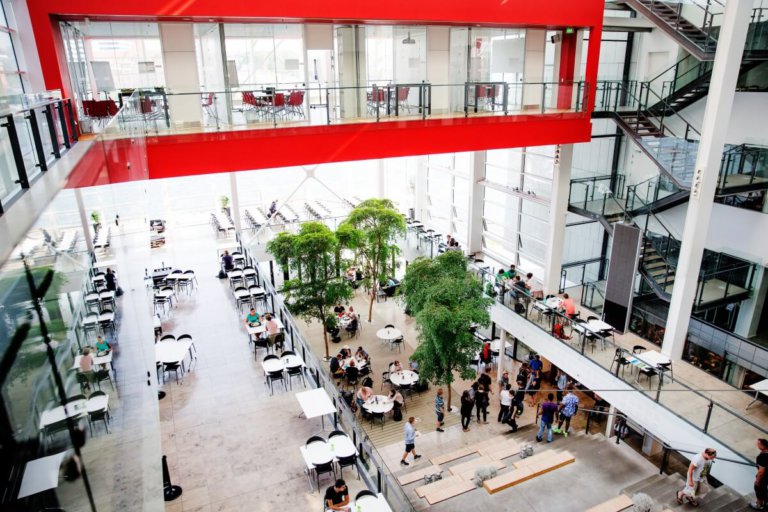
Within the broad field of engineering, niches and specialisations are emerging with the advancement of technologies like robotics and artificial intelligence. There is also greater emphasis on the importance of multidisciplinary approaches to engineering education such as mechatronics engineering.
At the University of Southern Denmark (SDU Sønderborg), there are innovative programmes in mechatronics engineering to prepare students for the exciting and dynamic future that lies ahead for this profession.
Alongside a BEng in Mechatronic Engineering, the university also offers the English-taught MSc in Engineering – Mechatronics. Both are educational experiences that combine state-of-the-art laboratories with excellent teaching facilities, ensuring optimal conditions and surroundings for researchers and students.
Mechatronics is the result of merging both electrical and mechanical engineering systems, which also includes a combination of robotics, electronics, systems, products, telecommunications and computer engineering.
Instead of focusing on one specialisation, students in these hybrid programmes are given opportunities to combine different disciplines in order to gain a deeper understanding of the intricacies of engineering.
This enables them to become more versatile engineers. No matter which career path they choose, they are able to combine different skill sets and technical skills and apply them towards developing new innovations and designing solutions to complex engineering problems.
If this is the future of engineering, students who want to forge a career in this field but are unsure which path to take would be wise to choose this major.
Not only does it prepare them for a rapidly changing future, a graduate degree in mechatronics is highly in demand by employers worldwide for their ability to combine different disciplines and utilise new engineering technologies.
Another innovative and interdisciplinary graduate course in a rapidly growing area of Engineering offered by the school is the MSc in Engineering – Electronics.
As almost all of our digital devices today contain power electronics and embedded systems in one form or another, the industry is booming with technology making future products more intelligent and energy-optimised.
Control and power electronics are also a major part of space crafts and satellites, among other things, to convert energy from solar panels, fuel cells and batteries.
Electronics engineers also work on the development of products such as smartphones, sensors and actuators, intelligent washing machines, drones, emergency power systems, frequency converters and robots.
Students in this course acquire skills in power electronics and embedded systems and a combination of the two disciplines, known as integrated application.
They will be a part of a study-based and collaborative learning environment where you work in project groups, responsible for planning and carrying out real-world projects by companies within the allotted time.
Developing employable and expert graduates
At SDU, mechatronics students work collaboratively and gain plenty of hands-on experience to prepare them for the real world – making them highly in demand in the global job market and valuable leaders when they graduate. A testament to this is data that shows approximately 80 percent of SDU Mechatronics graduates stay in Denmark after graduation.
Its unique ‘first job guarantee’ policy, for those who begin their studies in September 2020, will ensure that all SDU engineering students are guaranteed a job after graduation, subject to certain requirements.
Under this partnership with local companies in South Denmark, SDU graduates will be able to access the region’s companies specialising in energy-efficient technologies, which are crucial in the effort to drastically reduce CO2 emissions. These companies can fill the demand for skilled talent in this sector and in return, SDU graduates can develop valuable skills and build networking connections.
Such opportunities are great for students’ career development. Indeed, achieving professional growth is why 28-year-old MSc student Sunbul Javaid described her student job at electric linear actuator solutions multinational company Linak as her “most memorable practical experience” at SDU.
When she first started, Sunbul had no idea what to do. She was balancing this job in her final semester at SDU, as well as a thesis with HVAC multinational Danfoss. Her job at Linak entailed programming in Visual Basic (VBA), which she had not worked with before.
But it all turned out for the best, with Sunbul gaining a professional recommendation to boot.
“I am always passionate about learning new things and gaining practical knowledge while doing it. It was just a matter of getting into the subject and then it went quite smoothly from there. In fact, it ended up with really good comments and the manager offering himself as a reference in the future.”
“It made me more confident in believing in myself and the reward of hard work. The job I have at Danfoss is very challenging and has something new every day. So, for me, trying and succeeding in that new part of the programming world was very beneficial.”
Meeting a demand for innovative engineers
Located in Denmark, one of the world’s most innovative and progressive countries, to study here to is to have access to enviable job opportunities in this technological powerhouse.
Danish employers are rushing to hire engineering talent too. According to a report by the Danish Society of Engineers, the country is facing an estimated shortage of 13,500 engineers and science graduates by 2025.
Due to this rapidly rising demand, companies here need more qualified and capable engineers than ever before. Responding to this industry need, SDU Sønderborg works closely with several local companies to ensure its graduates are acquiring the required skills and latest industry-relevant knowledge needed to work for these companies.
For those who qualify, there is also a scholarship offered by the university for the MSc programme. The scholarship offers a full tuition waiver in addition to a small stipend which helps to partially cover living costs in Denmark.

University of Southern Denmark
Sunbul, who is originally from Pakistan, is one of the scholarship’s recipient. With the aid offered by the scholarship, it was an obvious choice for her to put her engineering career back home on hold to realise her dreams to study abroad. Furthermore, she would be able to do so in a country and university that would be able to offer advanced equipment and technology for the engineering studies that she wanted to pursue.
“Sadly, Pakistan cannot afford yet to have the luxury of very sophisticated technology needed to achieve my goal,” she said.
“It was a passion for me to go abroad and study in an institution that can offer my relevant study program equipped with the latest technology.”
Get ahead of the curve and become prepared for the future with an innovative degree in Mechatronics from SDU Sønderborg.
Follow the University of Southern Denmark on Facebook, Twitter, Instagram, YouTube and LinkedIn
Liked this? Then you’ll love…
Gain a world-class engineering degree in Denmark
4 APAC universities that are nurturing tomorrow’s engineering talent







